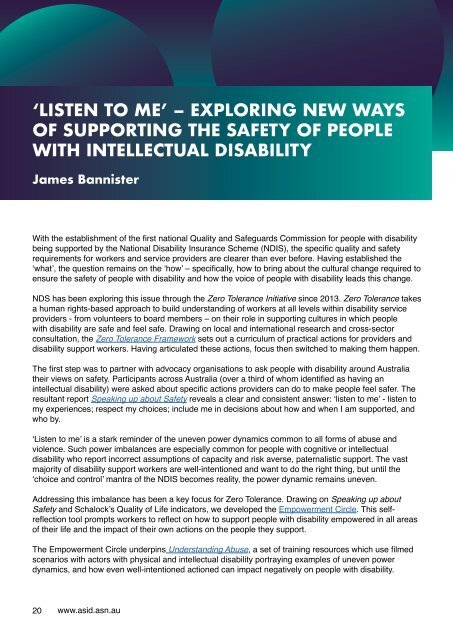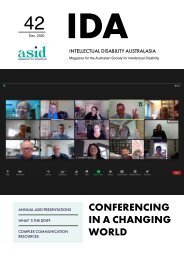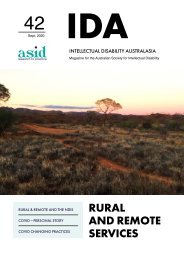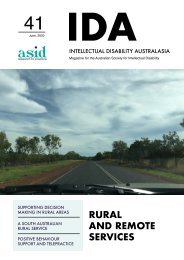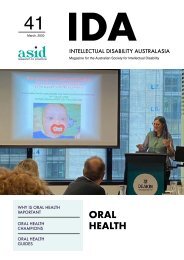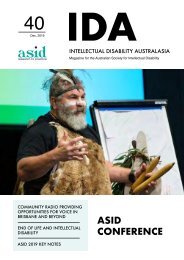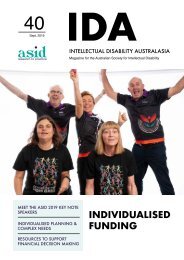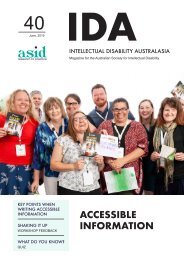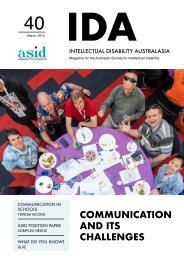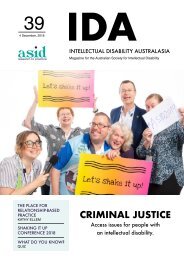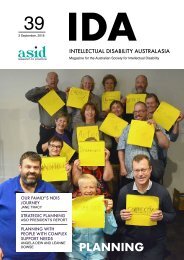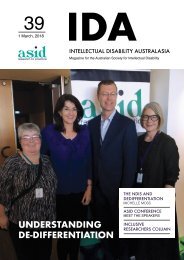You also want an ePaper? Increase the reach of your titles
YUMPU automatically turns print PDFs into web optimized ePapers that Google loves.
‘LISTEN TO ME’ – EXPLORING NEW WAYS<br />
OF SUPPORTING THE SAFETY OF PEOPLE<br />
WITH INTELLECTUAL DISABILITY<br />
Descriptive Sub-title Descriptive Sub-title Descriptive<br />
Sub-title.<br />
James Bannister<br />
With the establishment of the first national Quality and Safeguards Commission for people with disability<br />
being supported by the National Disability Insurance Scheme (NDIS), the specific quality and safety<br />
requirements for workers and service providers are clearer than ever before. Having established the<br />
‘what’, the question remains on the ‘how’ – specifically, how to bring about the cultural change required to<br />
ensure the safety of people with disability and how the voice of people with disability leads this change.<br />
NDS has been exploring this issue through the Zero Tolerance Initiative since 2013. Zero Tolerance takes<br />
a human rights-based approach to build understanding of workers at all levels within disability service<br />
providers - from volunteers to board members – on their role in supporting cultures in which people<br />
with disability are safe and feel safe. Drawing on local and international research and cross-sector<br />
consultation, the Zero Tolerance Framework sets out a curriculum of practical actions for providers and<br />
disability support workers. Having articulated these actions, focus then switched to making them happen.<br />
The first step was to partner with advocacy organisations to ask people with disability around Australia<br />
their views on safety. Participants across Australia (over a third of whom identified as having an<br />
intellectual disability) were asked about specific actions providers can do to make people feel safer. The<br />
resultant report Speaking up about Safety reveals a clear and consistent answer: ‘listen to me’ - listen to<br />
my experiences; respect my choices; include me in decisions about how and when I am supported, and<br />
who by.<br />
‘Listen to me’ is a stark reminder of the uneven power dynamics common to all forms of abuse and<br />
violence. Such power imbalances are especially common for people with cognitive or intellectual<br />
disability who report incorrect assumptions of capacity and risk averse, paternalistic support. The vast<br />
majority of disability support workers are well-intentioned and want to do the right thing, but until the<br />
‘choice and control’ mantra of the NDIS becomes reality, the power dynamic remains uneven.<br />
Addressing this imbalance has been a key focus for Zero Tolerance. Drawing on Speaking up about<br />
Safety and Schalock’s Quality of Life indicators, we developed the Empowerment Circle. This selfreflection<br />
tool prompts workers to reflect on how to support people with disability empowered in all areas<br />
of their life and the impact of their own actions on the people they support.<br />
The Empowerment Circle underpins Understanding Abuse, a set of training resources which use filmed<br />
scenarios with actors with physical and intellectual disability portraying examples of uneven power<br />
dynamics, and how even well-intentioned actioned can impact negatively on people with disability.<br />
20 www.asid.asn.au


